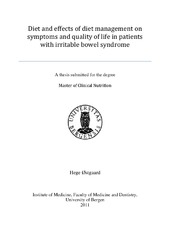Diet and effects of diet management on symptoms and quality of life in patients with irritable bowel syndrome
Master thesis
Permanent lenke
https://hdl.handle.net/1956/5169Utgivelsesdato
2011-05-16Metadata
Vis full innførselSamlinger
Sammendrag
Background: Irritable bowel syndrome (IBS) is a gastrointestinal disorder manifested by abdominal discomfort or pain, bloating and abdominal distension, and changes in the defecation pattern between diarrhoea and constipation. A significant proportion of IBS patients attribute their symptoms to food items and food intolerance. More information is needed on the effect of diet management in the treatment of IBS and this thesis is a contribution with effort to advance our knowledge about this aspect of the disorder. Aim: To investigate the diet and quality of life in IBS patients in comparison with the background population. Furthermore, to study the effects of guidance on diet management on changes in food intake, quality of life and symptoms. Design and methods: The study group included 35 healthy controls, 36 unguided IBS patients and 43 IBS patients who received guidance in diet management two years earlier. The controls and patients were asked to complete a Food Frequency Questionnaire (FFQ), a Short -Form Nepean Dyspepsia Index (SF-NDI) questionnaire, an Irritable Bowel Syndrome- Quality Of Life questionnaire (IBS-QOL) and a Birmingham IBS symptom score questionnaire. Results: With or without dietary guidance, there were no statistical differences in the intake of calories, carbohydrates, proteins and fat between the IBS patients and the controls. IBS patients made a conscious choice to avoid some foods belonging to the FODMAP group (fermentable oligosaccharides, disaccharides, monosaccharides and polyols). However, they consumed other food items which are rich in FODMAPs and avoided food sources which are important for their health. Two years after receiving guidance on diet management, IBS patient had a different diet profile. They consumed less FODMAP-rich foods, consumed more foods with probiotic supplements and less frequently avoided food sources that were important for their health as compared with unguided IBS patients. In addition, quality of life was improved and IBS symptoms was reduced. Conclusion: Although at the first sight the diet of IBS patients does not seem to differ from that of the background population, detailed examination shows avoidance of certain food items. Guidance on the management of diet improves their choice of a healthier diet, improves quality of life and reduces symptoms.
Utgiver
The University of BergenOpphavsrett
Copyright the author. All rights reservedThe author
